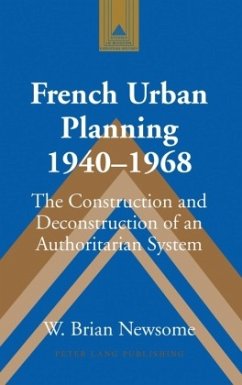French Urban Planning 1940-1968 explores the creation and progressive dismantling of France's centralized, authoritarian system of urban and architectural planning. Established in the wake of World War II to facilitate the reconstruction and expansion of cities, this planning program led to the evolution of large suburban housing estates plagued by inter/intra family conflict, juvenile delinquency, and other social difficulties, which sociologists connected to poor planning and design. Critics began calling for the democratization of planning to remedy design problems, and the government of Charles de Gaulle started reforming planning procedures in the late 1950s and early 1960s. This book moves beyond technical and political issues to explore forces of religion, gender, and class that affected planning practices. Key critics and state officials emerged from the Catholic Left. Some were women from working-class backgrounds, and they manipulated gender stereotypes to insert working- and middle-class women into the design process. Sometimes in opposition, but often together, these reformers initiated the most significant change of architectural and urban planning until the introduction of François Mitterrand's decentralization reforms in the 1980s. French Urban Planning 1940-1968 will appeal to scholars and students interested in architectural, urban, and social trends in twentieth-century France.
«Newsome's book offers a welcome look at the fascinating history of postwar French housing, a story that, to date, has largely only been told in French. (...) Newsome offers us an original take on this history, ably excising the study of housing policy from the more traditional narrative of modernization, while also sidestepping the more 'franco-français' debate about rehabilitating the 'grands ensembles'. Instead, Newsome uses his examination of the state's planning apparatus to revise received ideas about the Gaullist legacy and to highlight the contributions of the Catholic Left. Finally, by placing housing policy in a larger social and political context, he reminds us that answers to the questions of 'What will be built?' and 'Who decides?' have repercussions that may outlast the structures themselves.» (Nicole C. Rudolph, H-France Review 11, 2011)
«Newsome nous offre une synthèse très claire, s'appuyant sur de riches recherches en archives (ministères, archives nationales, établissements publics, archives départementales des Hauts-de-Seine ou du Finistère...), de la mise en oeuvre de ces politiques fidèles aux mesures prises sous Vichy - jusqu'aux noms des architectes choisis, souvent sous l'Occupation, pour conduire la reconstruction des villes détruites. Le choix de la date, 1940, sur laquelle s'ouvre cette fresque n'a donc rien d'anodin. (...) Cette fresque nous fait donc passer des rivages de la planification urbaine la plus stricte et la plus autoritaire à l'esquisse d'une 'participation' citoyenne, prélude à l'émergence des luttes urbaines des années 1970.» (Jean-Louis Voileau, Contemporary French Civilization 36, 2011/3)
«Newsome nous offre une synthèse très claire, s'appuyant sur de riches recherches en archives (ministères, archives nationales, établissements publics, archives départementales des Hauts-de-Seine ou du Finistère...), de la mise en oeuvre de ces politiques fidèles aux mesures prises sous Vichy - jusqu'aux noms des architectes choisis, souvent sous l'Occupation, pour conduire la reconstruction des villes détruites. Le choix de la date, 1940, sur laquelle s'ouvre cette fresque n'a donc rien d'anodin. (...) Cette fresque nous fait donc passer des rivages de la planification urbaine la plus stricte et la plus autoritaire à l'esquisse d'une 'participation' citoyenne, prélude à l'émergence des luttes urbaines des années 1970.» (Jean-Louis Voileau, Contemporary French Civilization 36, 2011/3)








